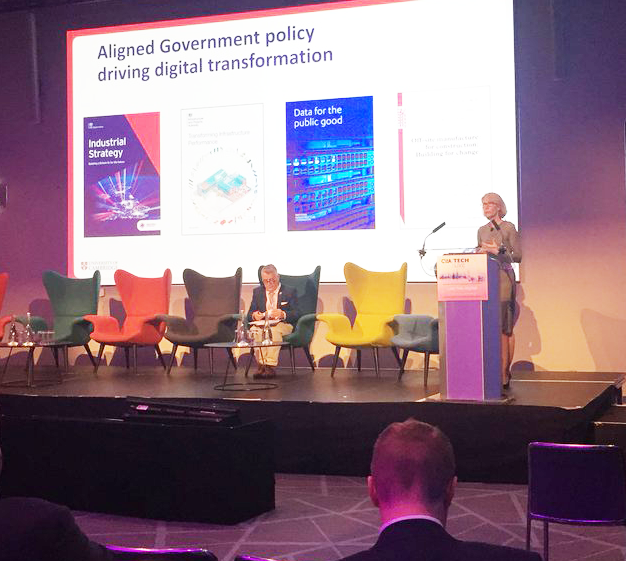
Submitted by Angela Walters on Tue, 20/11/2018 - 14:12
In her monthly roundup, Alexandra Bolton, Deputy Director of the Centre for Digital Built Britain, updates on the Centre’s latest activities.
Earlier this month the Centre supported the BSI BIM Conference in Manchester where the opening keynote, given by Dr Anne Kemp, the UK Convenor for ISO19650, highlighted the UK’s leadership in construction information management and the transition to international standards. Chair for the event, CDBB L2 Communications Manager David Philp, highlighted the ongoing progress being made by the Centre, with particular reference to the work of the Digital Framework Task Group (DFTG). The first outputs of the Group, the Gemini Principles – the founding values guiding the National Digital Twin and the underlying Information Management Framework, and facilitating alignment across the built environment – will be published later this month on the CDBB website.
I was delighted to speak at the CitA Tech Live event, organised by Construction IT Alliance (CitA), in Dublin this month. The two-day event attracted many industry professionals who heard from a number of key speakers and lively panel discussions about the latest innovations driving the digital transition including BIM, smart cities and IOT, drones, geo-spatial and reality technologies, robotics and automation and 3-D printing. The panel session I spoke at discussed the next steps for the digital transition of Ireland’s construction industry and my presentation, titled ‘Bytes & Mortar: The Potential for Digital to Transform the Construction and Infrastructure Sectors’, highlighted how digital technology is changing the way we plan, build, maintain and use our social and economic infrastructure, driving up commercial competitiveness and productivity to ultimately enhance our quality of life and well-being.
The Centre has worked alongside colleagues at the Centre for Smart Infrastructure and Construction (CSIC) this month to host a visiting delegation from Hong Kong interested to find out more about projects and research applying data, innovation and smart technology, including CSIC’s collaborative and award-winning work during London’s Bank Station Capacity Upgrade programme earlier this year. This collaboration developed a strain monitoring system to monitor the structural response of Christopher Wren’s Grade I listed St Mary Abchurch and George Dance’s Mansion House in order to enable cost efficient construction of the tunnels during the major upgrade works.
Our Security-Mindedness for Smart Infrastructure: Challenges and Opportunities event, held in association with CSIC at Downing College, Cambridge, was very well attended and brought focus to the challenges and opportunities of security-mindedness in the digital age. A number of high-level presentations from leading experts was followed by a workshop led by Alexandra Luck, Security Project Manager at CDBB and lead technical author of PAS 1192-5 and PAS 185, and Julian Schwarzenbach, Director of Data and Process Advantage. This gave delegates the chance to exchange experiences and consider a shared industry issue from a number of perspectives. More details of the outcomes from this event and links to useful sources of additional support and information – including copies of the Centre for the Protection of National Infrastructure’s (CPNI) Passport to Good Security for Senior Executives – can be found on our website.
A member of the CDBB faculty, Prof Duncan McFarlane, Professor in Industrial Information Engineering, has received funding support from EPSRC, for a Digital Manufacturing on a Shoestring [Digital Shoestring] project which he will lead, working with the University of Nottingham and a significant number of industrial organisations. The funding is part of a £1.6 million grant funding awarded to the University of Cambridge to help support the translation of digital capabilities into the manufacturing sector. The project, which is an inter and multi-disciplinary collaboration, will address a common concern that recent developments in digital manufacturing are unlikely to be accessible by SMEs, owing to the associated capital cost of upgrading industrial computing and communication environments. Seeking to exploit very low-cost commercially available technologies for mobile computing, sensing and Artificial Intelligence (AI), the project will tackle the challenges associated with integrating these safely and securely into a small scale manufacturing environment.
Engagement is a priority for the Centre, which is now on LinkedIn so please do connect with us. Our upcoming events, including our series of BIM Level 2 Roundtable Discussions and Network Workshops, in association with the Chartered Institute of Building (CIOB) are all listed on the events section of our website.
I look forward to meeting many of you at these events, but if you are not attending and would like to know more about our work, please do get in touch or subscribe to our monthly newsletter that highlights our activities. We are an open programme and always welcome engagement from the digital built environment community.
* photo courtesy of Cita.
